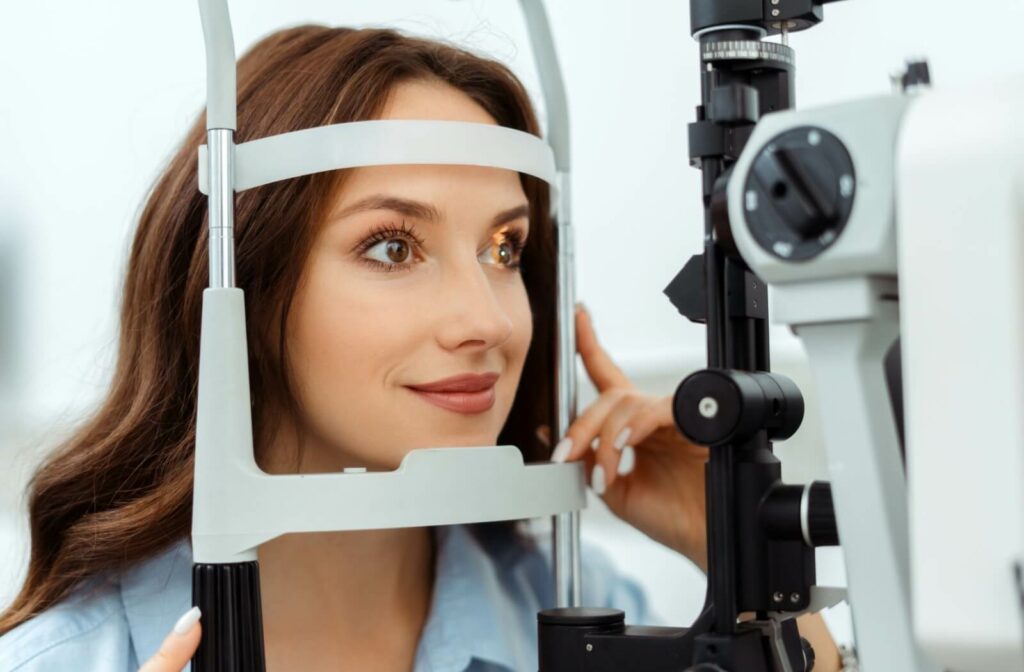When most people think of eye exams, they often associate them with checking vision and updating prescriptions for glasses or contact lenses. However, comprehensive eye exams can reveal much more than just your visual acuity. They can also detect a variety of serious health conditions.
Regular eye exams are important not only for maintaining good vision but also for early detection and management of various diseases. Here are some of the eye conditions and other diseases that can be detected during an eye exam:
- Glaucoma
- Diabetes and diabetic retinopathy
- Age-related Macular Degeneration (AMD)
- Hypertension
- Multiple sclerosis
- Thyroid disease
- Cardiovascular disease
- Autoimmune disorders
Glaucoma
What It Is
Glaucoma is a group of diseases that damage the optic nerve, often due to abnormally high pressure in the eye. It’s one of the leading causes of blindness for people over the age of 60.
How It’s Detected
During an eye exam, an optometrist or ophthalmologist measures intraocular pressure using a tonometer. They may also examine the optic nerve for damage by dilating the pupils and performing imaging tests like optical coherence tomography (OCT).
Diabetic Retinopathy
What It Is
Diabetic retinopathy occurs when high blood sugar levels cause damage to the blood vessels in the retina. If untreated, it can lead to blindness.
How It’s Detected
An eye exam can reveal early signs of diabetic retinopathy through retinal imaging or fundoscopy. These methods allow the doctor to see changes in the blood vessels or other abnormalities in the retina.
Age-Related Macular Degeneration (AMD)
What It Is
AMD affects the macula, the part of the retina responsible for our central vision. With AMD, central vision becomes weak, but peripheral vision may remain normal. AMD is a leading cause of vision loss in older adults.
How It’s Detected
Doctors can detect AMD by examining the retina. They may use an Amsler grid test to check for visual distortions or OCT to look at the layers of the retina.
Hypertension
What It Is
High blood pressure can lead to hypertensive retinopathy, a condition where the blood vessels in the retina become damaged.
How It’s Detected
Signs of hypertensive retinopathy include narrowing of the blood vessels, spots on the retina, and swelling of the optic nerve. These can be spotted during a retinal exam.
Multiple Sclerosis (MS)
What It Is
Multiple sclerosis is a disease that affects the central nervous system. In MS, the immune system attacks the body by mistake, damaging the myelin that protects the nerve fibers.
How It’s Detected
Optic neuritis, an inflammation of the optic nerve, is often an early sign of MS. An eye exam can reveal symptoms like reduced blurred or double vision, color distortion, and pain during eye movement.

Thyroid Disease
What It Is
Thyroid diseases, particularly Graves’ disease, can affect the eyes, causing conditions like thyroid eye disease (TED) or exophthalmos (bulging eyes).
How It’s Detected
Symptoms such as bulging eyes, swelling, and redness can be identified during a routine eye examination.
Cardiovascular Disease
What It Is
Cardiovascular diseases affect the heart and blood vessels, potentially leading to severe complications like heart attack and stroke.
How It’s Detected
Signs like retinal artery occlusions or changes in retinal blood vessels can indicate underlying cardiovascular problems. These can be spotted during a comprehensive retinal exam.
Autoimmune Disorders
What They Are
Autoimmune disorders occur when the body’s immune system attacks its own tissues. Examples include lupus and rheumatoid arthritis.
How They’re Detected
Conditions like uveitis (inflammation of the uvea) or dry eye syndrome can be early indicators of autoimmune diseases. These can be identified during an eye exam.
The Importance of Eye Exams
Regular eye exams are essential not just for maintaining good vision, but also for early detection of various diseases. Timely diagnosis and treatment can prevent serious complications and improve overall health outcomes.
Symptoms of other conditions and diseases can affect your eye health. If your eye doctor identifies any symptoms that warrant concern, you may be referred for further testing. Remember, your eye health is an important part of your overall health.
Comprehensive Eye Care
Don’t wait until it’s too late to detect potential health issues. At Precision Eye Care, we go beyond just checking your vision. Our comprehensive eye exams are designed to provide a full assessment of your ocular health and screen for various medical conditions. Take a proactive step toward your overall health. Book your comprehensive eye exam with Precision Eye Care now!





